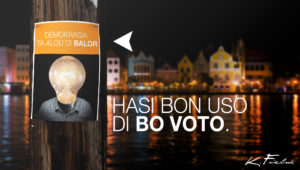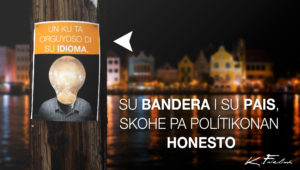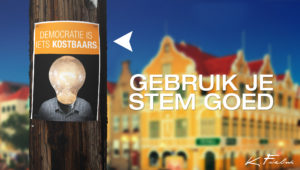ELEKSHON DI STATEN KÒRSOU
Statenverkiezingen Curaçao
Demokrasia ta algu di balor. Hasi bon uso di bo voto. Democratie is iets kostbaars. Gebruik je stem goed.
.
Skohe pa hendenan sinsero. Pa hendenan ku ta bon pa Kòrsou. Kies voor eerlijke mensen. Voor mensen die goed zijn voor Curaçao.
(5 di òktober 2016 / 5 oktober 2016) .
VISHON
Kolumna di Karel Frielink
Un reklamo ku bo ta tende hopi: gobièrnu no tin vishon. Bon mirá, kiko ta vishon?
Si ta trata di un pais, den nos kaso Pais Kòrsou, un vishon ta, pues, un imágen futuro ku ta duna inspirashon. Un soño alkansabel. Ideanan ku ta indiká kon Pais Kòrsou por i mester desaroyá den e siguiente 10 pa 20 aña. Ideanan ku nos ta kompartí kolektivamente. Den un palabra, un vishon di futuro. I nos ta sinti falta di esaki.
Na 10-10-10 pais Kòrsou a nase. Un pais ku un gran futuro su dilanti. Pero tambe un …
Read the rest »
I TURNED 50 TODAY!
Most stuff still works
I am happy and still enjoy life. I will keep on working to make Curaçao a better place to live for all human beings irrespective of their color, culture, race, nationality, language, religion, belief, age or sexual orientation.
I will spend my birthday with my wife, daughters and parents… and not on Facebook.
I have asked my family and friends to make a contribution to the “Akademia di Beisbòl Bandabou Tigers” in Curaçao in lieu of a birthday gift. And if you feel like contributing to this cause, please send an email for …
Read the rest »
LEZING NIEUW VENNOOTSCHAPSRECHT SINT MAARTEN
Nieuw Boek 2 BW en nieuw personenvennootschapsrecht
Op verzoek van de Orde van Advocaten te Sint Maarten heb ik op 21 mei 2014 in de Flamboyantzaal van het Courthouse te Sint Maarten een lezing gegeven voor de rechterlijke macht en de advocatuur. De lezing ging over enkele van de wetswijzigingen die in Sint Maarten op 1 april 2014 van kracht zijn geworden.
Er is een herzien Boek 2 Burgerlijk Wetboek (Rechtspersonen) ingevoerd en een nieuwe regeling inzake de personenvennootschappen. Mijn verhaal is hier te lezen.
Karel Frielink (advocaat)
(30 mei 2014)
.
DE ENE ADVOCAAT IS DE ANDERE NIET
En het ene kantoor is het andere niet…
Je moet werken vanuit je eigen identiteit en overtuiging. Dat kunnen we vandaag lezen in een interview met Mark van Eck van Business Openers in Advocatie.nl. Een kantoor dat werkt vanuit wat dat kantoor uniek maakt, waarin het zich dus onderscheidt van andere kantoren, is meer succesvol. De kern van zijn boodschap is dat je moet werken vanuit je eigen kracht, ofwel: doe waar je goed in bent. En hij bedoelt werken, niet alleen maar praten, en al helemaal niet praten over je concurrenten, laat staan negatief. Volgens Van …
Read the rest »
INDEPENDENT SUPERVISORY BOARD IN ST. MAARTEN
Should be mandatory for government-owned entities
Under the laws of St. Maarten, the main task of a board of supervisory directors is to supervise the board of managing directors of a limited liability company (NV or BV).
The St. Maarten Corporate Code provides for two different kinds of boards of supervisory directors, a “regular” board of supervisory directors and the so-called “independent” board of supervisory directors (Section 2:139 Civil Code). Within this context the word independent means that the supervisory directors are independent of the shareholders, interest groups (“belangengroepen”) and to a certain extent from the shareholders’ meeting.
An independent …
Read the rest »
LIFTING THE CORPORATE VEIL IN ARUBA
Only under exceptional circumstances
In terms of “piercing the corporate veil” and shareholders’ liability, the laws of the Netherlands and Aruba are nearly identical. As far as a tort matter concerns the laws of Aruba, Dutch case-law and Dutch legal literature should be considered as well.
In exceptional cases shareholders of an Aruba company can be liable for the company’s debts and obligations. Generally, two grounds for such liability are mentioned: a tort (onrechtmatige daad) committed by the shareholder and an “alter ego” situation (vereenzelviging) as regards the shareholder and his company. Under Aruba law, both can be categorized under …
Read the rest »
REGULATORY LAWS IN THE BES ISLANDS
There are three regulators
According to the Dutch Central Bank (“DCB”), financial institutions must be sound, reliable and stable to ensure confidence among businesses, consumers and others. DCB states on its website: “In addition to making certain their customers are properly informed about their products and services, these institutions also have a duty of care towards their customers. The financial services industry should also give a high priority to integrity and should never be used for money laundering, terrorist financing, fraud, corruption or other illegal activities. Finally, the market should function properly and there should be adequate market access, with …
Read the rest »
THE ARTICLES OF ASSOCIATION OF A CURAÇAO COMPANY (II)
Articles determine the nature of the company
A company’s articles of association determine the nature of the company (take for example the description of the purpose), regulate the internal competences (e.g. dismissal and appointment), limit the powers (e.g. decisions requiring approval), determine the internal responsibilities (e.g. drawing up the annual report and accounts), regulate the external powers (who represents the company in law), determine the method of decision-making, etc. As indicated above: the articles of association are somewhat comparable with the constitution or the state regulations of a country. The articles of association are therefore essential to the proper functioning …
Read the rest »
ANTI-MONEY LAUNDERING LAWS IN CURACAO
Money laundering is prohibited
Title XXXI of the Penal Code of Curaçao basically prohibits any type of money laundering.
The National Ordinance on the Reporting of Unusual Transactions (NORUT) obliges service providers acting in the course of a business or profession, to report unusual transactions.
The National Ordinance on Identification of clients when Rendering Services (NOIS) requires any service provider who is acting in the course of a profession or business, to establish the identity of a customer before providing any “financial” service.
Generally, these Ordinances apply when services are conducted in or from Curaçao. If a foreign financial institution does …
Read the rest »











